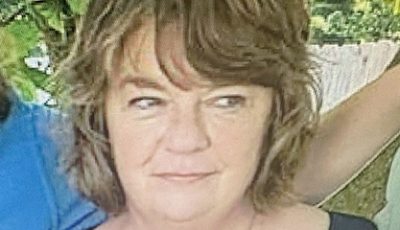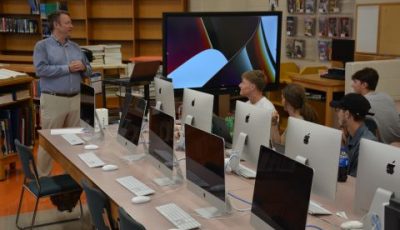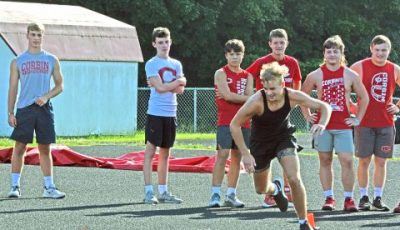Virtual Dementia Tour® training hosted at Christian Health Center

Because of a grant approved by the Kentucky Office of Inspector General, staff at the Christian Health Center in Corbin had the opportunity to complete Virtual Dementia Tour® training (VDT) on Feb. 24.
The training was provided by Second Wind Dreams® (SWD) and is available for up to 125 of Kentucky’s skilled nursing homes.
Vice President of Christian Care Communities James Patton said, “We are encouraged by this VDT training because it supports our dedication to providing exceptional care to our residents with dementia, and it blends wonderfully with our dedication to person-centered care.”
Patton explained that the staff at Christian Care knows the journey of those living with dementia is a lonely one and it takes the ability to identify with a resident’s needs from their perspective to develop empathy and top-quality care.
The two-day VDT course instructs two or more local staff facilitators who can then continue training staff and new hires once the SWD trainer has finished a course.
“This ‘train the trainer’ opportunity allows us to further our team member awareness of the challenges that our elders with Alzheimer’s and dementia face on a daily basis. For caregivers who have a loved one who has been impacted by dementia, I encourage you to take a virtual dementia tour – it is a life changing experience,” said Christian Care Communities CEO and President Mary Lynn Spalding.
Several individuals including nurses, administration and the chaplain were able to train at the Christian Health Center on Feb. 24 while David Nisbet, a certified VDT trainer was at the facility.
Nisbet became heavily involved in Virtual Dementia Tour® training after watching his father live with dementia.
“I’ve been on ‘that journey’,” Nisbet explained. “My dad was diagnosed with Lewy Body Dementia in 2015. [He] passed away in 2019.”
Nisbet said, “I watched my mom (even with all our help) get so worn down trying to care for my dad. When dad was first diagnosed, we were sent to Krogers Pharmacy with two prescriptions. Our primary care doctors gave us no path for this journey. We had to find it on my own.”
Because of his experiences, Nisbet explained, “I’m in this to help the care partners and caregivers. I always use this ‘line’ when I’m talking about dementia care – we have to stop this: when someone calls a known couple who is going through this journey, and they ask “How’s Tom?” The answer comes back “Toms good”. Then comes “How are you?”, and the answer is “I’m fine”. Last question is “Is there anything we can do for you?”. Last answer is “no, we’re good, we’re fine”. Tom is not good. She is not fine. They need more help than you can possibly imagine. We have to teach our communities (and this includes institutions of faith) to care for not only the one living with dementia, but the one caring for the person living with dementia.”
With a similar goal in mind, Janet Lovitt, the administrator at Christian Health Center, explained that this training helps staff interact with residents and family members.
“We want our staff to understand the Alzheimer’s resident so that they can understand how to give the very best care to the Alzheimer’s resident and interact with the family,” explained Lovitt.
Anna Eckert, a registered nurse and unit manager at Christian Health Center, is one of the two individuals to receive training to facility Virtual Dementia Tour® training for new and existing Christian Health Center employees.
Eckert has worked in dementia units prior to coming to Christian Health Center in Corbin.
“The key, to me, has always been educating the staff,” said Eckert. “If they don’t have that, they cannot give the appropriate care.”
“Being a minister for 30 years, I have dealt with this,” said Sherman Ramsey, the chaplain at Christian Health Center. “I remember when families had a crazy, old uncle or grandmother in the back room. In my opinion, that was probably Alzheimer’s or dementia, just undiagnosed and unknown at the time.”
“In a job like this or a place like this you have to have compassion, love, understanding, patience. Sometimes it takes me as much as two hours to calm a person down that has been upset, but you have to take that kind of time. I love this, and I hope it becomes a requirement here that all new employees have to go through,” Ramsey continued.
In addition to the initial training, the grant provides continued support contact between the nursing home facilitators and the expert VDT staff.
Nisbet will return to the facility later this year to follow up with the two employees he trained as facilitators.








